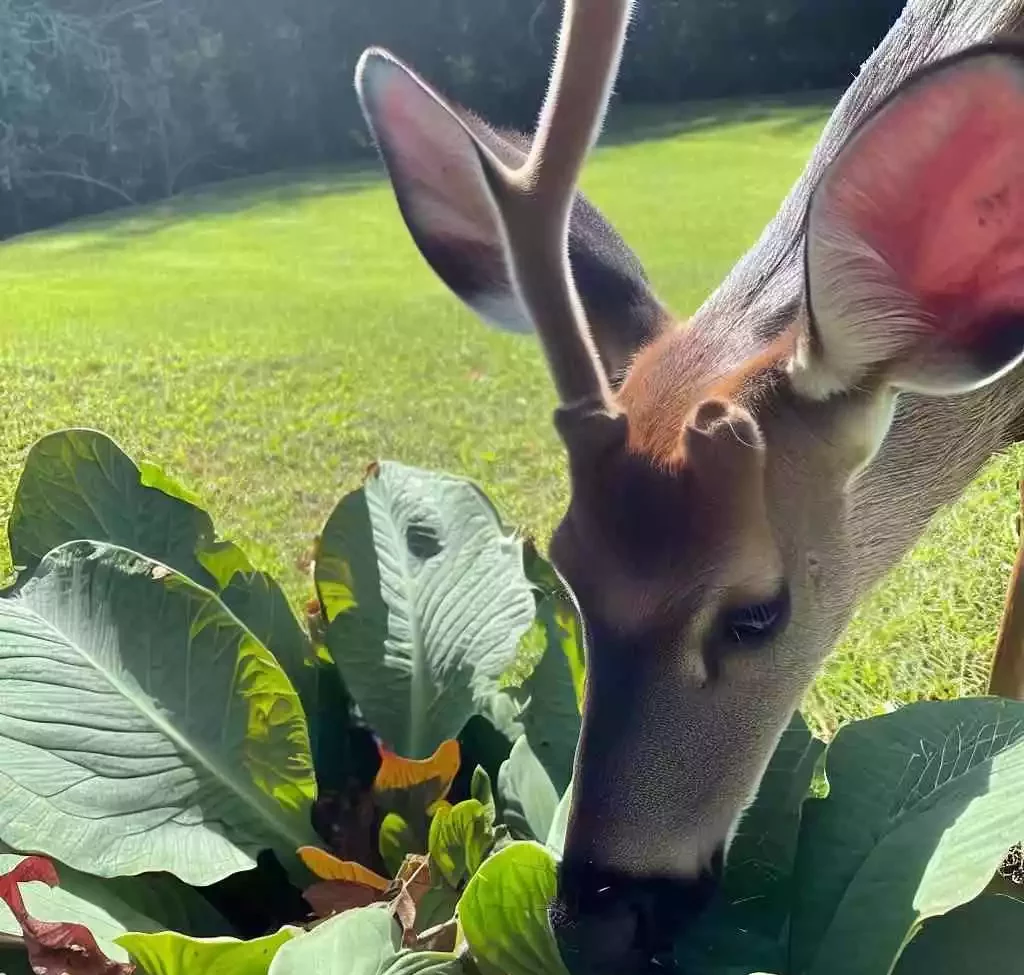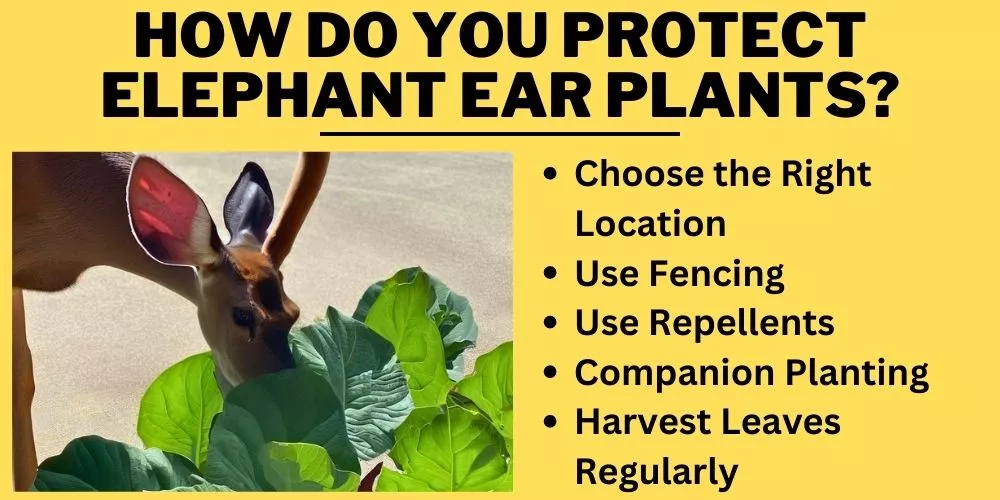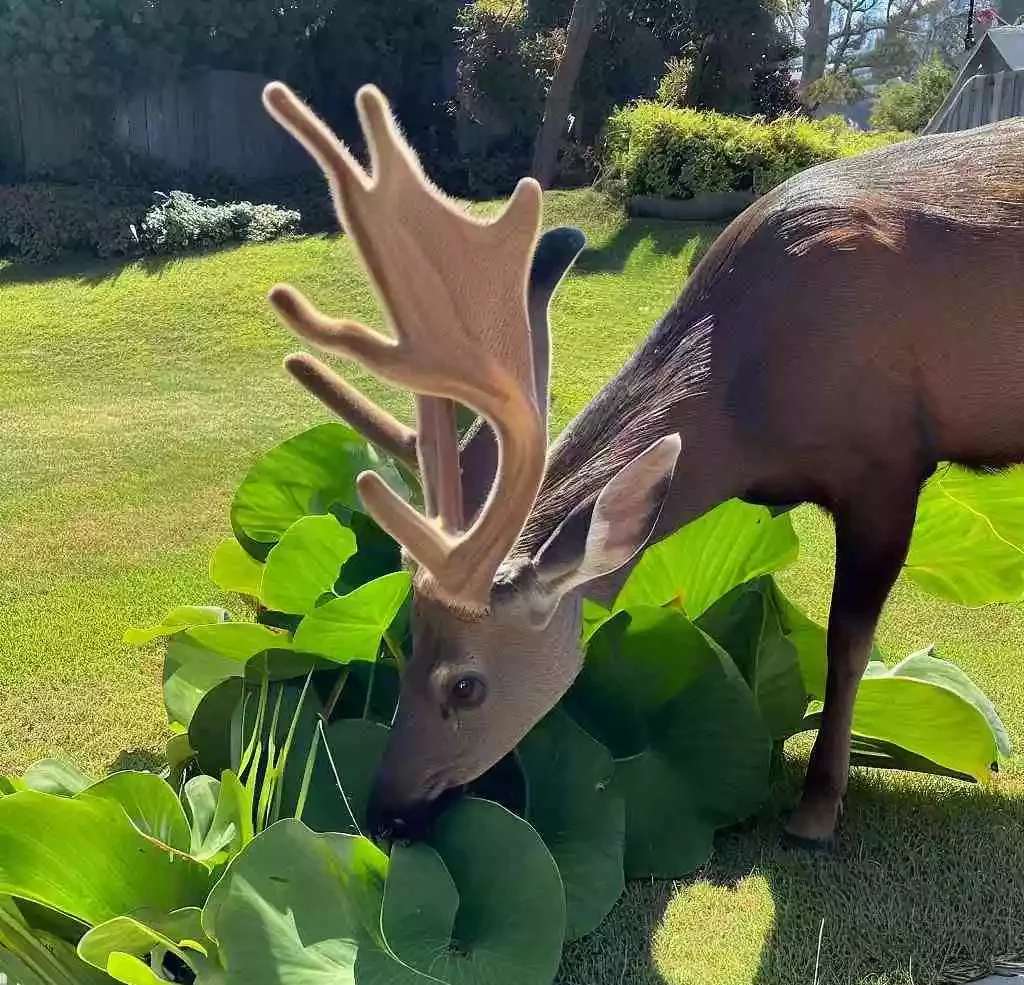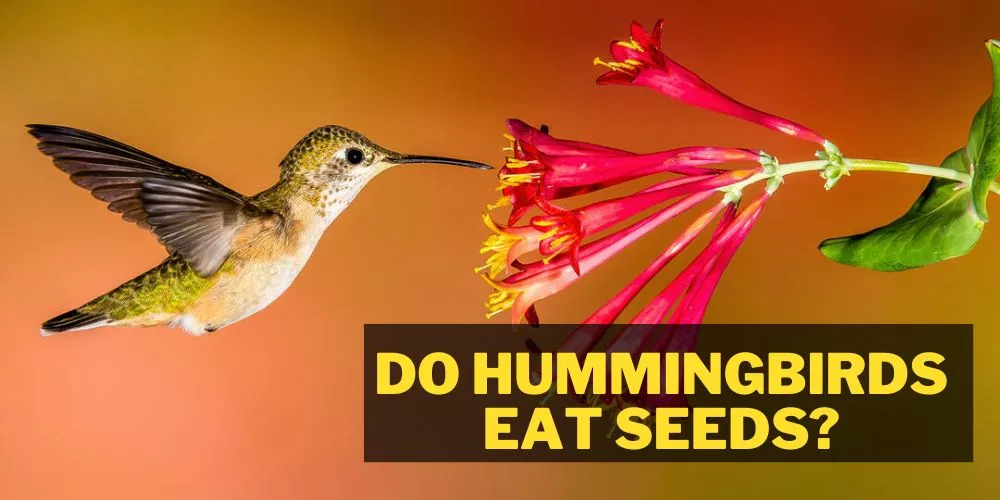Have you ever wondered do deer eat elephant ear plants or not? These beautiful and exotic plants are a popular addition to many gardens but can also be expensive. If you’re a gardener or plant enthusiast, it’s important to know what animals may pose a threat to your beloved plants.
In this article, I will explore whether deer are likely to munch on elephant ear plants. I will also look at the factors that determine deer’s eating habits and provide tips on protecting your plants from these curious creatures.

Do deer eat elephant ear plants?
Deer do not usually eat elephant ear plants (Colocasia esculenta) because these plants contain insoluble calcium oxalate crystals. These crystals can cause irritation to the mouth, throat, and gastrointestinal tract if ingested. As a result, deer tend to avoid elephant ear plants, making them a natural deer repellent in many gardens.
In desperate situations, such as during periods of drought or when other food sources are unavailable, deer may eat elephant ear plants. But, this is not a common occurrence, and the plants are generally considered deer-resistant.
What animals eat elephant ear leaves?
Elephant ear plants are most likely to attract insects and smaller animals that nibble away at their leaves over time. These animals include caterpillars, beetles, aphids, slugs, cutworms, and weevils. These animals are known to cause holes in the leaves of elephant ear plants as they feed on them.
- Caterpillars: Caterpillars, particularly the ones that turn into moths, may feed on elephant ear leaves. They chew on the foliage, causing holes and other damage to the leaves.
- Beetles: Different species of beetles, such as the Asiatic garden beetle and the black vine weevil, can cause damage to elephant ear plants by feeding on their leaves.
- Aphids: These small, sap-sucking insects can be found on the leaves and stems of elephant ear plants. They can cause the leaves to curl, discolor, and become distorted.
- Slugs and Snails: These mollusks feed on the leaves of elephant ear plants, leaving behind irregular holes and slimy trails.
- Cutworms: These moth larvae can feed on the leaves and stems of elephant ear plants, causing damage to the foliage.
- Weevils: Weevils, like the black vine weevil, can damage elephant ear plants by feeding on their leaves, causing notches on the leaf edges.
While these pests can cause damage to elephant ear plants, various pest control methods can help protect the plants from infestations. These methods include using insecticidal soaps, horticultural oils, and biological controls like beneficial insects to keep the pests in check
How do you protect elephant ear plants?
Elephant ear plants are a beautiful addition to any garden, but they can also be a tasty snack for many herbivorous animals. To protect your elephant ear plants from being eaten, you can follow a few simple steps:

Choose the Right Location
When planting your elephant ear plants, choose a location less likely to attract animals. Avoid planting in areas easily accessible to deer, rabbits, and other herbivores.
Use Fencing
Creating a physical barrier is one of the most effective ways to protect your elephant ear plants from animals. Use a fence at least 6 feet tall to keep deer out of your garden. You can also use chicken wire or mesh netting to create a barrier around individual plants.
Use Repellents
Another option is to use animal repellents to deter animals from eating your plants. Many different types of repellents are available, including chemical sprays and natural options like garlic or hot pepper spray. Apply the repellent according to the manufacturer’s instructions, and reapply as needed.
Companion Planting
Companion planting is planting certain plants together to benefit each other. Some plants, such as marigolds and lavender, have strong scents that can repel animals. Planting these plants around your elephant ear plants can help deter animals from eating them.

Harvest Leaves Regularly
One way to protect your elephant ear plants from being eaten is to harvest the leaves regularly. By removing the leaves, you reduce the amount of food available to animals, which may discourage them from eating your plants.
By following these steps, you can protect your elephant ear plants from being eaten by animals and enjoy their beauty in your garden for years.
Do elephant ears keep deer away?
Elephant ear plants can deter deer due to their size, smell, and taste. However, planting elephant ears may not be enough to keep deer away from your yard entirely. No plants are truly deer-resistant or can repel deer 100% of the time. To further prevent deer from entering your yard, it may be prudent to use additional methods such as hanging wind chimes or setting up double fence perimeters.
If you are a gardener you may also find useful: Do Deer Eat Hollyhocks? | Do Deer Eat Rhododendrons?
Frequently Asked Questions (FAQs)
Are elephant ear plants poisonous to animals?
While elephant ear plants are not poisonous to animals, they contain calcium oxalate crystals, which can cause irritation and swelling in the mouth and throat. This can be particularly dangerous for small animals, such as rabbits and rodents, which may choke on the leaves.
What scares deer away?
Deer are easily frightened by loud noises, sudden movements, and unfamiliar scents. Some effective deer deterrents include motion-activated sprinklers, predator urine, and noise-making devices like wind chimes or radios.
What keeps deer away from plants?
Physical barriers like fences or netting are the most effective way to keep deer away from plants. Natural repellents like garlic or hot pepper spray can also be effective, as can companion planting certain plants that deer find unappealing. However, no method is 100% foolproof, and it may take a combination of strategies to keep deer away from your plants.
Conclusion:
The consumption of elephant ear plants by deer remains a topic of interest for gardeners and wildlife enthusiasts. While deer are known to be opportunistic feeders with a wide range of dietary preferences, it is important to note that elephant ear plants contain high levels of calcium oxalate crystals, which can cause irritation and toxicity if ingested. As a result, it is generally believed that deer tend to avoid these plants in favor of more palatable options.
However, there may still be instances where deer consume elephant ear plants out of curiosity or necessity, particularly in areas where food sources are scarce. To protect both deer and elephant ear plants, it is recommended that gardeners utilize deer-resistant landscaping strategies and consider planting alternative vegetation that is both safe and appealing to local wildlife.


